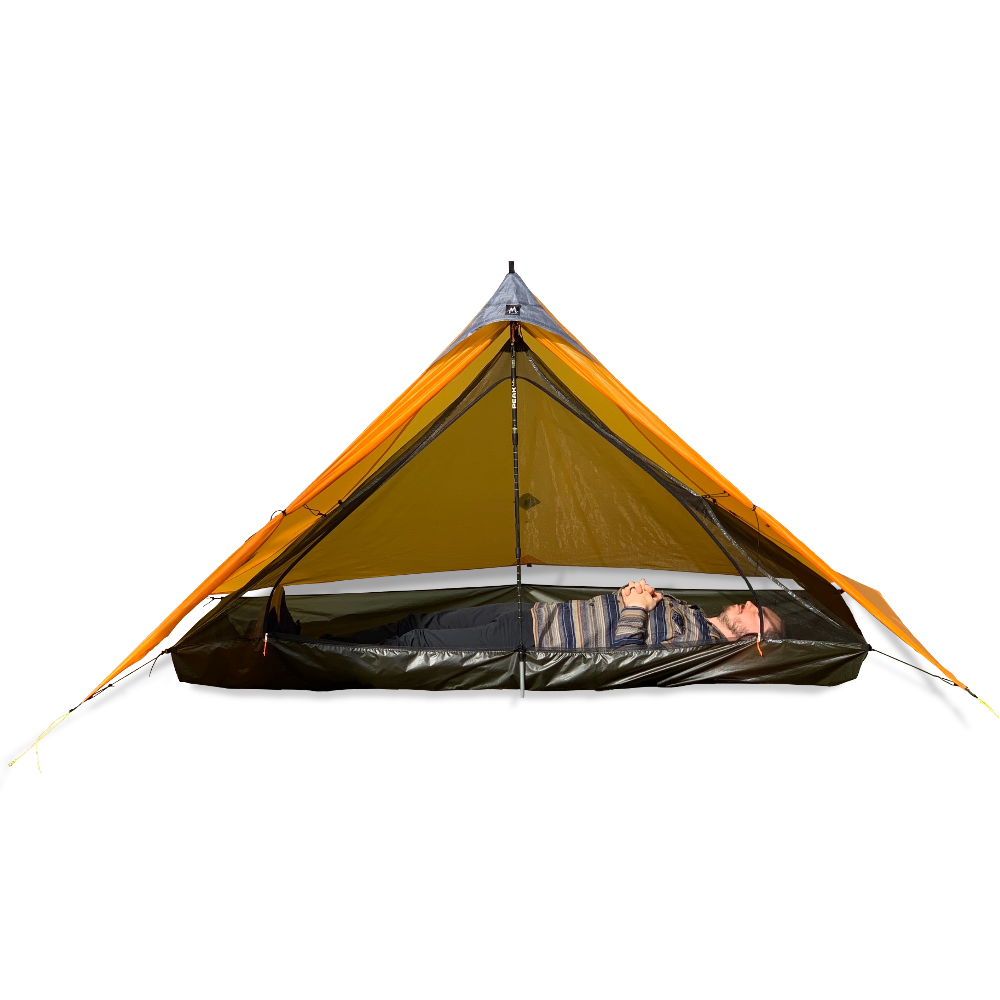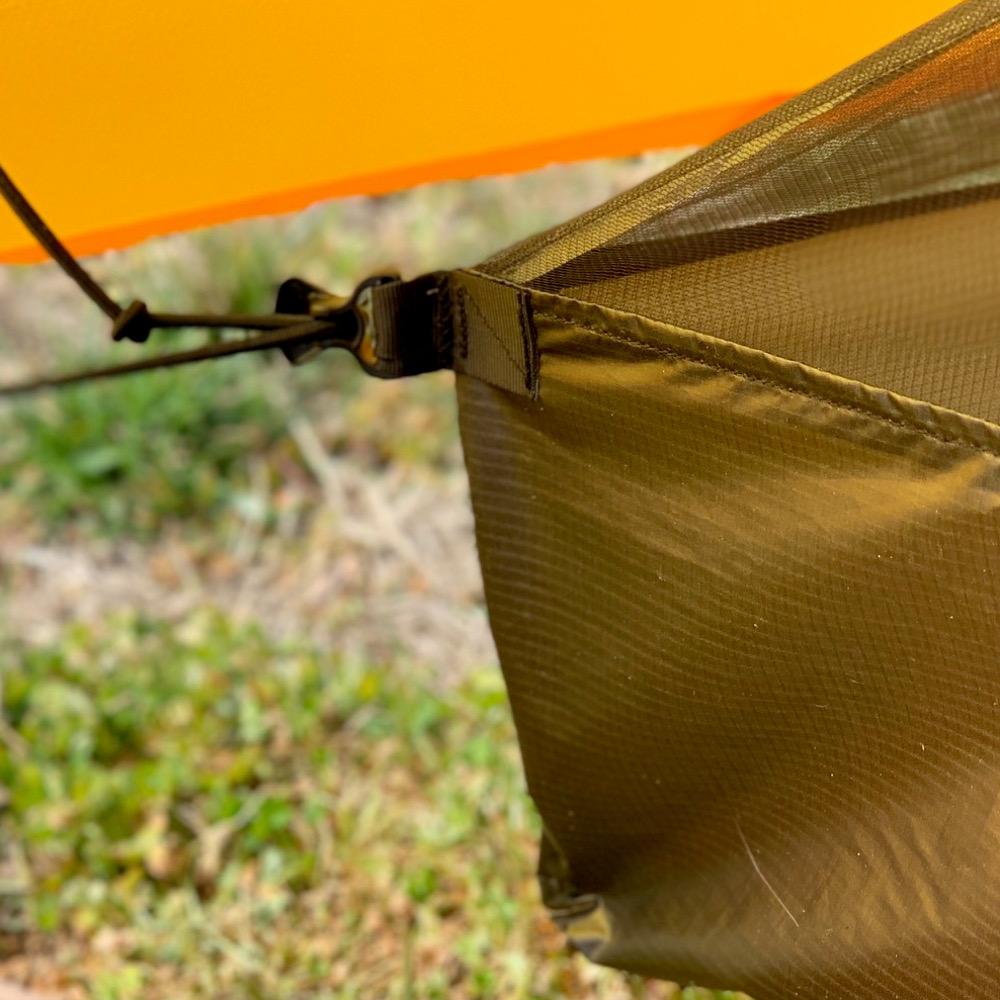Topic
Lightest solo net tent to date
Forum Posting
A Membership is required to post in the forums. Login or become a member to post in the member forums!
Home › Forums › General Forums › SuperUltraLight (SUL) Backpacking Discussion › Lightest solo net tent to date
- This topic has 9 replies, 5 voices, and was last updated 3 years, 2 months ago by
 Monte Masterson.
Monte Masterson.
-
AuthorPosts
-
Jan 2, 2022 at 11:10 am #3735929
At 6.0 oz my latest creation weighs the same as the lightest bug bivys, but provides about twice the space. The 5″ high 7D silnylon bathtub floor has no struts or cantilevers so therefore I can’t get the floor perfectly tight and even looking. It does however keep the weight at an SUL level. Also the corner tieouts are 5″ off the ground which allows them to be attached to tarp corner tieouts with shockcord. This doesn’t make for quite as even and taut of a floor as if the tieouts were instead on the ground, however it’s a compromise. The 2 main top panels are made with RSBTR 0.5 oz noseeum. The foot end triangle is (solid) .93 oz membrane silpoly to protect from blowing rains. Front triangle is .65 oz Questoutfitters noseeum. Net measures 32″ high and 34″ wide on front and is only 2″ lower and narrower at the foot end. 86″ long.
2 zip front entry and exit with both YKK #3 zippers meeting in lower left corner. Bottom horizontal zipper is placed 3″ down onto the bathtub floor to allow for a much larger opening. That only leaves 2″ off the ground in front, but that can be mitigated.
Jan 2, 2022 at 2:25 pm #3735943Any pics of it pitched under a tarp??? I love it!!
Jan 2, 2022 at 3:35 pm #3735960No dirtbag, but I’ll take some pics of the net under a 20D silpoly tarp I just made, probably in the next day or so. Tarp measures 67″ X 106″ so it’s basically the same size as a borahgear solo tarp. I had the silpoly tarp in mind when I made the net tent. Should match up perfectly with a 13.5 oz combined weight for both, not including stakes, lines, shockcord and polycro.
All of the other solo net tents I’ve seen over the years, such as the now discontinued MLD Serenity, Yamagear, etc have been 38″ to 41″ high (head). Of course with that height you’ve got to have a tarp at least 7′ wide. I had a Serenity and was supremely made as with all MLD products, however, I thought its height was too high in proportion to its width. Nowhere have I ever seen a lower profile net tent like this one I made. Another reason I got into MYOG was so I could make exactly what I wanted with whatever materials.
Jan 2, 2022 at 4:34 pm #3735965Ohhh yea. How sweet it is!
Jan 2, 2022 at 4:48 pm #3735967Wonderfully light, Monte. It looks like it pitches plenty taut with the corner style you’ve chosen.
Jan 3, 2022 at 4:22 am #3736002I didn’t get the floor just perfect and professional looking, but it will work fine for my own uses when the backpacking season begins. I’ll try a little different floor technique on the next project. It’s taken me a long time to figure out how to sew 0.5 noseeeum onto silnylon without the netting stretching more, at least with my machine anyway. I tried a walking foot, however that didn’t work. So now I heavily pin the hemmed silnylon OVER the netting. It’s a little trickier to pin everything together that way, but it keeps both materials advancing at the same rate because the much stretchier 0.5 oz noseeum is being constantly pulled by the feed dog. I also like to stick on 1″ wide pieces of masking tape about every 3″ to help keep everything in order.
I had read that Ron at MLD stopped using struts for his pyramid innernets and that looks to be the case. My Solomid innernet has the struts and it works well, but it also all adds significant weight and complexity if you ask me. The Serenity Net Tent I had was the older style without corner struts and the silnylon floor was angled the same as the netting, with the corner tieouts about 1.5″ off the ground. It pitched great but you did have to anchor all 4 corners, which can add more weight. That’s why I like attaching the net floor corner pullouts to the tarp corner tieouts with just minimal lengths of shockcord. It’s easy and it cuts weight, yet the floor is left hanging there, so it doesn’t make for pics with a perfectly drum tight floor, especially when the material is a superlight and wrinkly 7D silnylon.
But tell me if I’m wrong, does it not look as if Ron has ditched the corner cantilevered struts on the MLD innernets? And instead is just attaching with shockcord the innernet corner pullouts to mitten hooks sewn inside the fly (and opposite tarp tieouts)? The basic and simple approach is the lightest.

 Jan 3, 2022 at 7:12 am #3736006
Jan 3, 2022 at 7:12 am #3736006Monte, yes, it looks like that, and those MLD photos are what I thought of when I saw and read of the way you’ve made your corners.
There are downsides to this style – I have a couple inner tents from a custom pyramid tent that are made similarly – namely, the floor is not as ‘stable’ or taut, and the tension from the inner tent corners exerts an inward force at the outer tent tieouts. I’m not super concerned about the former, but the latter can affect the pitch of the outer tent or tarp.
It looks like Ron is using shock cord run through a Lineloc 3, and I suspect that that is the way to go. Mine has only shockcoard, so adjustability is a pain. With Linelocs I think it would be possible to get enough tension on the floor without distorting the pitch of the fly.
Maybe none of this is an issue at all for your tarp setup. My tent is an eight-sided mid, so quite a bit different.
And there are advantages, as you’ve noted. Probably the lightest weight style and might also limit how much movement, twisting, etc. of the floor gets transmitted into the fragile mesh. I think it probably also better preserves the dimensions of the mesh part of the inner, and thus the interior space.
Monte, have you played around with RBTR’s 0.7 Monolite Mesh?
Jan 3, 2022 at 7:50 am #3736009Looks good!
Jan 3, 2022 at 9:15 am #3736011Nice work Monte.
Jan 3, 2022 at 12:09 pm #3736033Stumphges,
I haven’t used any of the Monolite, but someone suggested it for a tougher bottom netting on an all net bug bivy I made awhile back. They are probably right as to what would be an optimum floor material, however, I’d bet anything it’s way bulkier than regular .67 or 0.5 noseeums. So using it for the 2 main top panels might not be so good. And I’m sure it’s stiffer and not as pliable as the noseeums. That makes a big difference in how well and easily a net pitches taut, at least with the uberlight ones I make. I’ve found not enough elasticity, like you see for example with 0.9 oz or Questotfitters .65 noseeums, makes for a net which needs more pull on the tieouts get the desired tautness. It’s a delicate nuance when working with superlight netting materials. Cat cuts are important too. Don’t get me wrong, the Questoutfitters .65 is stronger than Dutchware or RSBTR’s .67’s, but it’s way bulkier and not as pliable and supple. Great for front and rear triangles and net floors though. It looks and feels like 0.9 oz. I had to weigh it in order to believe it actually wasn’t 0.9. The Dutchware and RSBTR .67 oz noseeums are the best choice for the 2 main panels in my opinion, with the RSBTR being a little higher quality (and $1/yard more). 0.5 oz noseeum is very good, yet it’s expensive (like Monolite) and not easy to work with.
The lightest nettings will hold up fine if properly constructed and pitched in a manner where they aren’t pulled on too hard. After making 15 different bug nets over the past 6 years I’ve learned what and where the weaknesses are with the lightest noseeums. 1) I absolutely reinforce every single corner with 0.9 netting. I take 4″ or 5″ squares and cut them diagonally to make triangles. Corners are by far the weakest points where the netting will fail first. 2) I also use only Guterman Terra 80 thread and 70/10 needles. The Terra 80 is much thinner than Mara 70, but still very strong for most ultralight applications. 3) It’s always best to have 3/32″ shockcord on all tieouts, at least with the superlight noseeums I use anyway.
-
AuthorPosts
- You must be logged in to reply to this topic.
Forum Posting
A Membership is required to post in the forums. Login or become a member to post in the member forums!
Trail Days Online! 2025 is this week:
Thursday, February 27 through Saturday, March 1 - Registration is Free.
Our Community Posts are Moderated
Backpacking Light community posts are moderated and here to foster helpful and positive discussions about lightweight backpacking. Please be mindful of our values and boundaries and review our Community Guidelines prior to posting.
Get the Newsletter
Gear Research & Discovery Tools
- Browse our curated Gear Shop
- See the latest Gear Deals and Sales
- Our Recommendations
- Search for Gear on Sale with the Gear Finder
- Used Gear Swap
- Member Gear Reviews and BPL Gear Review Articles
- Browse by Gear Type or Brand.





